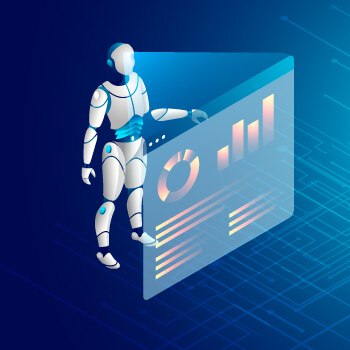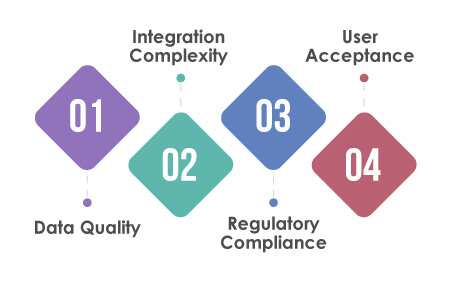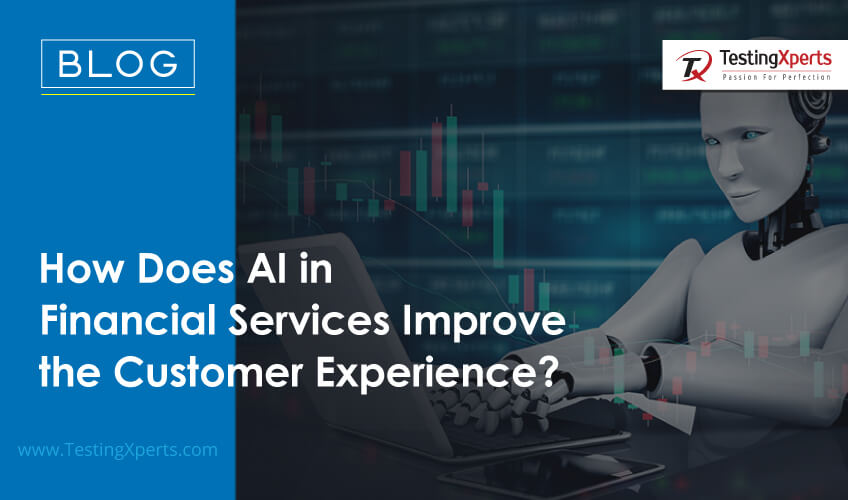
Table of Contents
- The Role of AI in Quality Assurance
- Challenges of Implementing AI in Quality Assurance
- Benefits of AI-Led Quality Assurance
- AI Testing Tools for Quality Assurance
- Conclusion
- How can TestingXperts help transform QA using AI
Artificial Intelligence (AI) is drawing substantial financial investments and genuine enthusiasm from prominent entrepreneurs because of its promising advantages. Companies are eagerly adopting AI in quality assurance to streamline their operations and lower expenses. AI facilitates the efficient sharing of data, forecasts customer behavior, offers product recommendations, identifies fraudulent activities, tailors marketing to specific demographics, and delivers valuable customer support.
If you’re still uncertain about the practicality of AI, here are some astonishing statistics:
• 63% of companies acknowledge that the pressure to cut costs will drive them to adopt AI.
• 61% of business leaders assert that AI assists them in identifying business opportunities they might otherwise overlook.
The Role of AI in Quality Assurance

To evaluate software and its functionalities, it is essential to develop a test suite and generate test data. Nevertheless, this procedure is time-consuming. On average, when employing manual testing methods, it accounts for more than one-third (approximately 35%) of the total time expended during a testing cycle.
In addition to this, manual testing is susceptible to human errors, which can lead to increased expenses and consume more time and resources – something no business is eager to invest in.
Additionally, as software becomes more intricate, the number of tests naturally grows, rendering it progressively harder to maintain a test suite and ensure sufficient code coverage.
In such situations, leveraging artificial intelligence for quality control can expedite the mobile app testing procedure and surmount all the aforementioned challenges. The key areas where AI enhances testing processes in quality assurance encompass:
• Comprehensive supervision of API testing.
• Automation of testing operations.
• Determining the optimal timing and methodology for executing a test script.
• Utilizing AI-based spidering tools for more effective data analysis.
Here are a few limitations of manual testing and How AI can change that:
| Limitations of Manual Testing | How AI can Change that |
| 1. Human Error | Reducing Human Error – AI ensures consistent and precise test execution, minimizing the risk of human error, such as oversight and fatigue. |
| 2. Resource-Intensive | Efficiency and Cost Savings – AI accelerates testing processes, resulting in significant time and cost savings, making testing more cost-effective. |
| 3. Repetitive Tasks | Eliminating Repetitive Tasks – AI automates repetitive testing tasks, allowing human testers to focus on more valuable activities. |
| 4. Inadequate Test Coverage | Comprehensive Test Coverage – AI can execute a vast number of test cases, covering a wide range of scenarios and edge cases, ensuring thorough examination of the software. |
| 5. Scalability Challenges | Scalability – AI is highly adaptable and scalable, capable of handling the increased complexity and size of modern software projects. |
Challenges of Implementing AI in Quality Assurance

Implementing AI in Quality Assurance (QA) introduces a range of complex challenges that organizations must address to ensure the successful integration of artificial intelligence into their quality control processes. These challenges include:
Data Quality:
QA teams must grapple with the need for high-quality training data. Ensuring that the data used to train AI models is accurate, representative, and free from biases is a crucial initial step.
Integration Complexity:
Integrating AI into existing QA systems can be a daunting task. Ensuring compatibility, data flow, and proper synchronization with legacy processes is essential for a smooth transition.
Regulatory Compliance:
Depending on the industry, there might be specific regulations and data privacy laws that must be adhered to when implementing AI in QA. Ensuring compliance with these regulations is a critical concern.
User Acceptance:
Convincing QA teams and stakeholders of the benefits and reliability of AI-driven processes is essential. Education, training, and effective communication are required to gain trust and acceptance.
Benefits of AI-Led Quality Assurance
The utilization of Artificial Intelligence (AI) in software testing brings forth distinctive advantages that can significantly transform the quality assurance process. Let’s explore these benefits in detail, particularly focusing on how AI contributes in transforming Quality Assurance:
Speedy Timelines:
Efficient Test Execution:
AI-driven test automation can execute a vast number of test cases at unprecedented speeds, significantly reducing the time required for testing. Tasks that might take human testers days or weeks can be accomplished in a matter of hours.
Faster Regression Testing:
AI streamlines regression testing by automatically re-running test cases to check for unintended side effects. This ensures that new code changes don’t break existing functionality, enabling faster release cycles.
Well-Researched Build Releases:
Predictive Analysis:
AI can analyze historical testing data and software performance metrics to predict potential defects. By identifying areas of the software that are more likely to contain issues, teams can focus their testing efforts on high-risk areas, leading to more well-informed build releases.
Continuous Monitoring:
Real-time monitoring by AI can detect anomalies and performance issues in production, helping in pinpointing areas that require immediate attention before a new build release.
Going Beyond the Limits of Manual Testing:
Comprehensive Test Coverage:
AI can perform extensive and exhaustive testing, covering a multitude of scenarios and edge cases that manual testing may overlook. This thorough test coverage ensures that software is rigorously examined.
Scalability:
AI-powered testing is highly scalable, accommodating the increasing complexity and size of modern software projects. It can adapt to new technologies, larger datasets, and evolving testing requirements, something that manual testing often struggles to achieve.
Effortless Test Planning:
Intelligent Test Case Generation:
AI algorithms can autonomously generate test cases, making the test planning process more efficient. These generated test cases often cover critical paths, boundary conditions, and high-impact scenarios, saving time and effort in test case creation.
Test Prioritization:
AI can prioritize test cases based on their criticality and potential impact, simplifying test planning by ensuring that the most important tests receive primary attention.
AI Testing Tools for Quality Assurance

AI testing tools for quality assurance have gained popularity in recent years for enhancing testing efficiency and accuracy.
Applitools:
• Applitools offers Visual AI testing, a technology that uses AI and machine learning to automatically detect and analyze visual differences in the user interface of applications. It’s particularly useful for web and mobile app testing.
• It can identify visual defects such as layout issues, rendering problems, and functional bugs.
• Applitools provides a visual validation platform that integrates with various test automation frameworks and tools, making it easy to add visual testing to existing test suites.
Test Sigma:
• Test Sigma is an AI-driven test automation platform that aims to simplify test creation and maintenance.
• It uses natural language processing and AI to enable testers and non-technical users to create automated test scripts.
• The platform offers features like self-healing tests, easy maintenance, and cross-browser testing.
SauceLabs:
• Sauce Labs is a cloud-based platform for automated testing, including both web and mobile application testing.
•While it’s not exclusively an AI testing tool, it offers AI-powered testing capabilities to improve test execution and analysis.
•It provides a wide range of real devices and virtual environments for running tests and supports various testing frameworks.
TestCraft:
• TestCraft is a cloud-based test automation platform that uses AI to generate and maintain test scripts.
• Its AI engine identifies changes in the application under test and adjusts test scripts accordingly to ensure they remain functional.
• TestCraft supports web and mobile app testing and offers integration with various CI/CD tools.
These tools leverage AI and machine learning to enhance the efficiency and accuracy of quality assurance processes. When choosing the right tool for your specific needs, consider factors such as the type of applications you’re testing (web, mobile, desktop), the level of technical expertise in your team, and the integration capabilities with your existing testing framework or tools. It’s also essential to evaluate factors like cost, scalability, and support to determine the best fit for your organization’s requirements.
Conclusion
The integration of Artificial Intelligence into Quality Assurance is ushering in a new era of efficiency, accuracy, and effectiveness in software testing and product quality control. AI-driven solutions are revolutionizing the way businesses approach quality assurance, from automating repetitive and time-consuming testing tasks to enabling predictive defect identification and improving performance and security testing. With AI, organizations can streamline their testing processes, ensure consistent quality, and ultimately deliver higher-quality products to their customers. This transformation not only enhances product reliability but also reduces costs, accelerates time-to-market, and equips businesses with the agility needed to thrive in an increasingly competitive technological landscape. Quality assurance for AI Systems is a testament to the ongoing evolution of technology in the pursuit of excellence and customer satisfaction.
How can TestingXperts help transform QA using AI

TestingXperts, as a specialized software testing and quality assurance company, offers comprehensive AI-driven solutions to facilitate the transformation of your quality assurance processes. They can leverage AI to enhance the efficiency, accuracy, and agility of your testing initiatives. By employing AI-powered test automation, TestingXperts can help you reduce manual testing efforts, accelerate test execution, and enhance test coverage. Their expertise in developing self-healing test scripts and frameworks ensures that your tests remain robust even as your applications evolve, reducing maintenance overhead. Additionally, they can optimize test data management through AI, ensuring the availability of diverse and realistic data sets for thorough testing. This not only improves the quality of your tests but also contributes to data privacy compliance with AI-driven anonymization techniques.
Furthermore, TestingXperts can assist in predicting potential defects through AI-based analysis of historical data and patterns, allowing your QA teams to proactively address vulnerabilities before they impact your software’s performance. Their AI-driven performance testing solutions simulate real-world user behavior and load patterns, providing valuable insights into system performance under varying conditions. With their expertise in AI-enhanced security testing, TestingXperts can identify security vulnerabilities and weaknesses, helping you safeguard your applications and data. Whether you need to optimize test cases, automate testing processes, or bolster your security measures, TestingXperts’ AI-driven solutions are tailored to elevate the quality assurance landscape of your organization, enabling you to deliver robust, secure, and high-quality software products to your customers.
Discover more
Get in Touch
Stay Updated
Subscribe for more info




